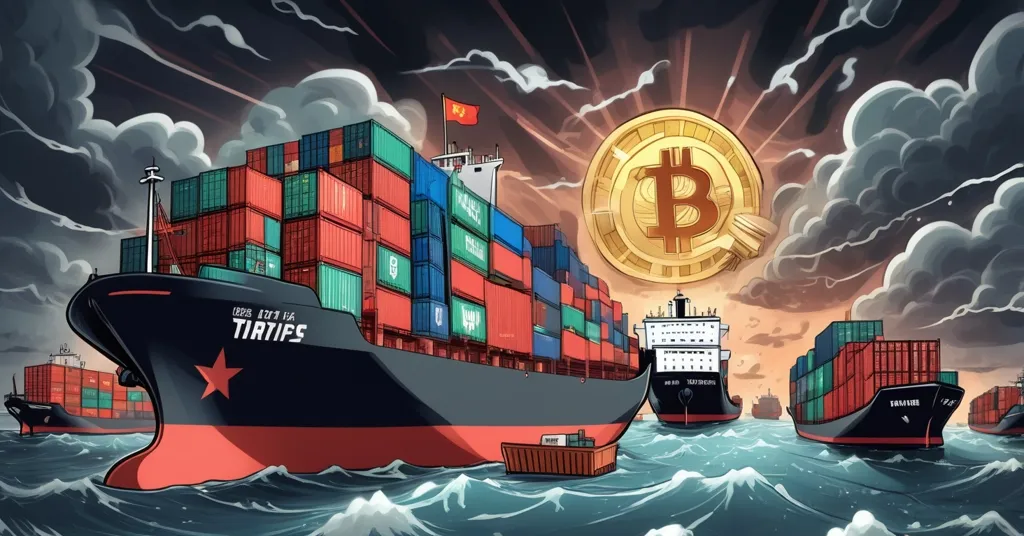Japan Blasts Trump’s Tariffs as Trade Wars Threaten Global Economy and Boost Crypto Appeal

Japan Slams Trump’s “Truly Regrettable” Tariffs as Global Trade Tensions Boil Over
Donald Trump has once again thrown a grenade into the global trade arena with a fresh round of tariffs set to bite on August 1, drawing sharp rebukes from Japan and a chorus of frustration from nations across Asia, Africa, and beyond. With levies ranging from 20% to a punishing 40% on over a dozen countries, the US President’s protectionist gambit is rattling markets and straining alliances, while Japan vows to keep dialogue alive in hopes of softening the blow.
- Japan’s Outcry: Prime Minister Shigeru Ishiba calls the 25% tariff on Japanese goods “truly regrettable,” pushing for talks to revise rates before the deadline.
- Global Fallout: South Korea (20%), Thailand (36%), Malaysia (25%), and South Africa (30%) face steep tariffs, with smaller economies hit even harder at up to 40%.
- US Terms: The White House offers a sliver of hope, suggesting adjustments if “serious counteroffers” are tabled by August 1, though doubts linger on outcomes.
A Gut Punch to Allies: Japan and South Korea Lead the Pushback
The latest tariff blitz, broadcast via Trump’s Truth Social platform with all the subtlety of a sledgehammer, harks back to the market-shaking trade wars of 2018-2019. Back then, tariffs on China spiked consumer prices and sparked retaliation—now, history seems poised for a sequel with a broader net. Japan, slapped with a 25% import tax (up from a rumored 24%), isn’t taking this lying down. Prime Minister Shigeru Ishiba called the move a bitter pill for a loyal partner, emphasizing that decades of alliance with the US shouldn’t come with such a steep price tag. His stance reflects a broader sentiment of frustration, as detailed in reports about Japan’s regret over Trump’s new tariffs.
“Depending on Japan’s response, the content of the letter could be revised,” Ishiba stated, hinting at a narrow window to negotiate before the tariffs lock in.
South Korea, pegged at a 20% tariff since April, has sent Trade Minister Yeo Han-Koo to Washington for face-to-face talks with US Commerce Secretary Howard Lutnick, zeroing in on exemptions for steel and automobiles. While no firm deals have emerged, there’s a whiff of cautious optimism in the air. But let’s not kid ourselves—tariffs like these aren’t just numbers on a page. A 25% tax on Japanese goods could turn a $1,000 TV into a $1,250 burden by the time it hits US shelves. Protectionism, at its core, is about shielding domestic industries—think US steel jobs over cheap imports—but it often means higher costs for everyone. And when allies get caught in the crossfire, diplomacy takes a beating, as outlined in analyses of Trump’s latest tariff announcements.
Emerging Economies Stagger Under Heavier Blows
Beyond the big players, the tariff storm is battering smaller economies with even harsher rates. Thailand faces a jaw-dropping 36% levy, prompting Finance Minister Pichai Chunhavajira to voice outright shock while clinging to hope for a last-minute reprieve through talks.
“I was a little shocked by the latest rate… it might still fall before the deadline if talks continue,” Chunhavajira remarked, grasping for optimism.
Malaysia, now at 25% up from 24%, is doubling down on negotiations, with its Ministry of Investment, Trade and Industry pledging to work toward a “balanced, mutually beneficial, and comprehensive trade agreement.” South Africa, hit with a 30% tax, brought a damning stat to the table via President Cyril Ramaphosa, pointing out the lopsided nature of current trade rules.
“77% of US goods entered the country with zero tariff… [we call for] a fair and balanced trade relationship,” Ramaphosa argued, exposing the raw deal his nation faces.
The list of casualties doesn’t stop there. Nations like Indonesia (32%), Bangladesh (35%), Cambodia (36%), and even Myanmar and Laos (both at 40%) are reeling under some of the steepest rates, while others like Britain and Vietnam have snagged partial relief—Vietnam’s tariff dropped to 20% from a proposed 46%, though a 40% penalty lingers on transshipped goods often tied to China. The EU, notably, dodged a tariff letter entirely as it angles for a broader trade pact. This scattershot approach raises eyebrows: is this about fairness, or a geopolitical chess game with China as the real target? Insights into this strategy are explored in discussions on US trade policies affecting ASEAN and China.
Market Jitters and Expert Skepticism: Is Negotiation Just a Mirage?
The White House claims these tariffs aren’t set in stone—countries have until August 1 to pitch “serious terms” for adjustments, with China getting an extended deadline to August 12. Beijing, predictably, isn’t playing nice, warning against exclusion from global supply chains and slamming Trump’s tactics as “bullying” through state media. But trade experts aren’t holding their breath for happy endings. Deborah Elms of the Hinrich Foundation poured cold water on the idea of meaningful concessions, hinting at deeper US motives, as noted in updates on Japan’s trade negotiations with the US.
“ASEAN members that worked hard to develop packages received almost all the same treatment as countries that either did not fly to DC or were not invited to meet,” Elms noted, suggesting a US obsession with curbing China-linked supply chains in Asia over rewarding good-faith dialogue.
Some, like former US trade negotiator Wendy Cutler of the Asia Society Policy Institute, see a faint light at the end of the tunnel, insisting “the game is not over” for breakthroughs before the deadline. But markets are already feeling the heat—US stocks dipped 0.8% on the S&P after the announcement, with sectors like tech and autos bracing for inflation ripples that’ll likely hit American wallets hardest. Asian markets showed mixed grit, with Japan’s Nikkei rebounding and South Korea’s indices up 1.8%, but Tapas Strickland of National Australia Bank warns of volatility ahead as deadlines loom. If 2019’s trade war is any guide—when consumer prices spiked and global growth stuttered—we’re in for a rough ride unless cooler heads prevail. For a broader historical context, check out this overview of Trump’s tariff policies and their global impact.
Bitcoin and Blockchain: The Trade War Escape Hatch?
Now let’s talk about why this matters to our crowd. These trade spats aren’t just squabbles over steel or semiconductors—they’re a glaring neon sign pointing to the cracks in centralized financial and trade systems. Tariffs inflate costs, gum up supply chains, and often screw consumers more than they save jobs. Sound like a broken record? It’s the same old story of political whims and government overreach that Bitcoin was born to sidestep. When stocks tank 0.8% on a single policy tweet—or Truth Social rant—while fiat currencies wobble under trade uncertainty, Bitcoin’s appeal as a borderless, unassailable store of value starts to shine. During the 2019 trade war peak, Bitcoin rallied over 20% as investors fled fiat chaos, a trend explored in analyses of Bitcoin as a hedge during geopolitical tensions. Could we see a repeat?
Then there’s blockchain’s broader potential to upend this mess. Decentralized finance, or DeFi, cuts out banks and middlemen by using blockchain tech—think of it as a digital ledger no single government controls—to handle transactions. Smart contracts, self-executing agreements coded to trigger when conditions are met, could automate trade deals without tariff tantrums getting in the way. Projects like IBM’s TradeLens already aim to make supply chains transparent, slashing inefficiencies that tariffs only worsen, as detailed in resources on blockchain applications in global trade. Imagine a world where Thailand’s exporters bypass a 36% tax hike by settling in stablecoins on Ethereum or other chains, or where Bitcoin hedges South Africa’s rand against US policy shocks. Sure, scalability and adoption hurdles remain—Bitcoin isn’t ready to replace global trade overnight, and not every altcoin’s stable enough for the job—but the seeds of disruption are there.
Let’s not get too starry-eyed, though. Bitcoin maximalists like myself will argue it’s the ultimate safe haven when fiat burns, immune to border taxes or political games. But I’ll tip my hat to altcoins filling niches—Ethereum’s smart contracts could streamline trade faster than Bitcoin alone, and stablecoins on other chains might bridge gaps for everyday transactions. Still, when push comes to shove, nothing beats Bitcoin’s track record as a middle finger to centralized chaos. On the flip side, a US steelworker might defend these tariffs as a lifeline for local jobs—“We need this shield against cheap imports,” they’d say. Fair enough, but decentralized systems don’t pick winners or losers based on borders—they level the damn field. Community discussions on platforms like Reddit highlight Japan’s tariff challenges under Trump’s policies.
Key Takeaways and Burning Questions on Trade Wars and Crypto’s Role
- What are Trump’s new tariff rates and their impact on global trade?
Rates span 20% for South Korea to 40% for nations like Myanmar, effective August 1, hiking costs for goods, straining alliances, and risking inflation and supply chain delays worldwide. - How are key countries like Japan and South Korea responding?
Japan’s Prime Minister Ishiba labels the 25% tariff “truly regrettable” and seeks dialogue, while South Korea negotiates in Washington for exemptions on steel and autos, both racing against the deadline. - Is there any real chance for tariff reductions through talks?
The White House dangles flexibility for “serious counteroffers” by August 1, but analysts like Deborah Elms doubt significant change, though deals with Vietnam (down to 20%) show some wiggle room. - Why is China a shadow player in this tariff strategy?
US focus on Asian nations likely ties to curbing China’s supply chain dominance, with Beijing’s August 12 deadline and retaliation threats adding fuel to potential escalation. - How can Bitcoin and blockchain counter trade war fallout?
Bitcoin offers a hedge against fiat volatility sparked by trade uncertainty, as seen in 2019’s 20% rally, while blockchain and DeFi enable borderless, transparent trade systems—though adoption and scale remain challenges. - Are trade wars a catalyst for decentralized adoption?
Possibly—if centralized systems keep faltering under tariff stress, more players, from governments to traders, might turn to Bitcoin and blockchain, accelerating the shift to systems free of political whims. For further opinions on this, see perspectives on how tariffs impact Bitcoin and global trade.
As the August 1 deadline looms, the world watches a high-stakes game of brinkmanship unfold. Japan’s determination to negotiate, South Korea’s boots on the ground in Washington, and the broader chorus of discontent from Thailand to South Africa show a refusal to bow quietly. Yet with China’s shadow looming and market turbulence already brewing, the odds of dodging Trump’s tariff hammer look slim. This chaos tests the old guard of global trade to its breaking point, begging a provocative thought: if trade wars speed up the collapse of centralized control, should we root for more disruption to force decentralization’s hand? Bitcoin and blockchain stand ready as wildcards, and in this economic pressure cooker, they might just steal the show.



